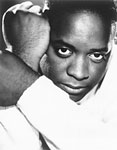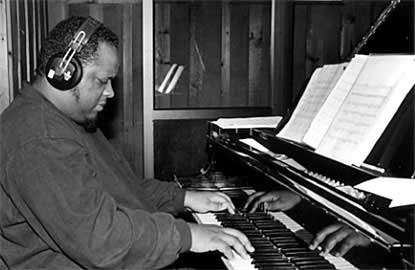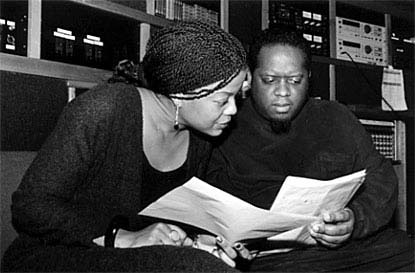  |
||
 "Julian Joseph can be counted among the most important musicians Britain has ever produced." "...I would hear a big luscious chord or orchestration on the radio or television that I liked. When I asked what it was I would always be told that jazz had something to do with it." "I see music as a journey of one's own self-discovery and it can lead you down many roads." "I believe that you make your own opportunities and in that regard, things have not changed significantly." "There has been an increase in new and alternative outlets with broadcasting turning digital and the internet. It is a new frontier and the music and its purveyors will find their way." |
|
ARTIST IN FOCUS: Okay, so we are playing Jazz. So you've got to think fast. By: Kimberley Berry  photo by Cheung Ching-Ming Depending on the era that you came of age, the term "British Invasion" conjures images of the Beatles, the Rolling Stones or the Who (this "invasion" did not sit well with British jazz musicians who, like many American jazz musicians considered this a death knell). In the 1980's, African American Classical music experienced it's own "British Invasion" concurrent with the emergence of twenty-something artists (or "Young Lions"). With the arrival of Coltrane-influenced saxophonist Courtney Pine, Steve Williamson, the Jazz Warriors, vibraphonist Orphy Robinson and the Bobby McFerrin-isque vocal styling of Cleveland Watkiss. Collaborative efforts spanned the UK and the US. Fast forward to the present: Many of these artists have moved on to combine jazz with other forms of music, rap, hip-hop, but one veteran of that invasion remained true to the classic straight-ahead mode: pianist Julian Joseph. Why jazz, especially in a country that isn't known for its jazz innovators? I don't exactly know why jazz except as a child I always could relate to music with the jazz identity attached. For example, if I would hear a big luscious chord or orchestration on the radio or television that I liked, when I asked what it was I would always be told that jazz had something to do with it. Who are some of your influences? My first major influence was Oscar Peterson because he was part of my growing up. His television show was on regularly and my mother allowed my brothers and I to stay up and watch. These shows informed me of people like Duke Ellington, Roy Eldridge and Ray Charles. When I was about eleven my brother John heard the single, "I Thought It Was You," by Herbie Hancock and said: "this is who you should check out." And, I did! John was only twelve or thirteen, but that changed my life, and I along with my brothers tried to acquire all of Herbie's recordings, which led me to all the people he worked with -- the great Miles Davis in particular. My curiosity about where all these musicians came from made me wonder who their influences were! How did you develop your talent in London's jazz scene? Who mentored, encouraged and inspired you? Whilst in Secondary School (your equivalent would be High School) I had a drum teacher named Trevor Tomkins who made tapes for me, my brothers and all his students who were interested in music. A great educator and well-respected drummer on the scene Trevor and a bass playing teacher made my first Trio at school. Then one of my English teachers told me about a workshop run by the respected trumpeter and author Ian Carr so I joined and met musicians like Mark Mondesir, Steve Williamson, Cleveland Watkiss and Courtney Pine. The workshop was part of WAC (Weekend Arts College) and catered for drama, dance and technology as well as music. When I was there Academy Award Nominee Marianne Jean Baptiste (Secrets and Lies) also attended, and, as well as being a most accomplished actor, was also a great vocal talent. Although not everyone I mentioned attended the workshop, it did become a great meeting point and on a Sunday evening I would hold rehearsals for my first proper band, which included Courtney, flautist Philip Bent, bassist Paul Hunt and a great drummer named, Frank Tontoh until Mark Mondesir showed up! Meeting Courtney changed things for us because he was a little older and starting to do professional gigs. When did you first come to the United States? What was your impression of the American jazz scene? Which American artists inspired and encouraged you? I first came to the United States to study at Berklee and ended up performing and recording by my second semester. My impression of Berklee was that it had a very comprehensive approach to learning to be a skilled contemporary musician. The jazz musicians were quite conservative and traditional - and that was what I needed - although there were a few exceptions. In the big wide world Branford and Wynton Marsalis always inspired me, Donald Brown my piano professor and Mulgrew Miller my friend and mentor. Being in the United States enabled me to see a whole host of artists including James Moody, Jay McShann, McCoy Tyner, Herbie Hancock, Michael Brecker, Dave Leibman, Terence Blanchard, Donald Harrison, Harry Connick, Jr. and the great Benny Golson to name just a few. How did you become a professional musician? I broke onto the scene working with Courtney Pine and quickly started doing my own gigs and as I was still in full-time education, anything I was earning was a bonus and helped convince my family - who always encouraged me - that I was on the right path. I was drawn to America, the home of Jazz and it was important for me to continue my education so I investigated further education possibilities in the United States and went to the Berklee College of Music in Boston. What do you hope to accomplish with your program Jazz Legends on the BBC? My program with the BBC is a show highlighting the legends of the music from the perspective of the musician with the use of the BBC's recorded archive. I choose the music and write the scripts, but I do get a lot of positive input from my producer Felix Carey and my brothers John and James. James is also my manager and comes to all the recording sessions. Quite simply we try to present a musical biography of various artists using the archive and/or CD's and interviews. It has led to me trying to get interviews with as many musicians as possible in order to get their perspective documented. Sometimes the show is a discussion with pieces chosen by an invited musician expert in a particular Legend. We keep the format open so that the show stays interesting, informative and not locked too much into a formula. You recently recorded with gospel-jazz artist Ruth Naomi Floyd. How did this project come about? What are your thoughts on the concept or "gospel-jazz"? My brother James and Keith McKinley were working together when Keith was introducing Ruth and her music to Britain. Keith and my entire family and friends got on so famously that when we finally met Ruth it was like welcoming a member of our family. I was intrigued by Ruth's approach to jazz, there is a natural connection musically between jazz and gospel, but because jazz has associations born from where it was played, i.e., in places thought of as very un-Christian, Ruth is realigning and reconciling Christian subject matter to material that is uncompromising in its embodiment of jazz. In some quarters this could be considered quite taboo but I believe that Ruth's implementation is radical, innovative and handled with a strength of purpose, character and understanding.  Vocalist-composer Ruth Naomi Floyd in the studio with pianist-composer Julian Joseph. photo by Cheung Ching-Ming "...there is a natural connection musically between jazz and gospel, but because jazz has associations born from where it was played, i.e., in places thought of as very un-Christian, Ruth [Naomi Floyd] is realigning and reconciling Christian subject matter to material that is uncompromising in its embodiment of jazz. . . " You are adept at mixing jazz and popular music and interpreting the music of R&B icons like Curtis Mayfield. You've performed and recorded with a variety of non-jazz artists. Did you ever consider making your living in more lucrative genres of music? I believe that Jazz is very lucrative, but it is important that with the skills and knowledge one gains as a jazz musician to allow the other forms of music that one likes to enter the musical bloodstream in order to acknowledge your own identity. Also, it is important never to rule things out and go for the things you believe in. Many of your contemporaries who received recognition during the British jazz invasion (Courtney Pine, Steve Williamson, for example) are playing jazz-hip hop and other styles of music. Yet, you remain dedicated to mainstream jazz. Why? I love the music I play and the challenge it brings because on a profound level, we all know what people like Duke, Bird, Miles, Trane, Wayne and Herbie have contributed. I see music as a journey of one's own self-discovery and it can lead you down many roads. At the moment, I have many things to investigate in order to get the most out of myself as a jazz musician in the melodic, harmonic, rhythmic domain utilizing swing and the other variations it brings, including the removal of all of those elements. How all of that relates to and comments on the world we're living in challenges me as an artist. When I hear potential for that challenge to be investigated with the use of other forms of music, I hope to be able to approach my continuing journey keeping an open mind, enthusiasm and love. You took a long hiatus from performing and working in the States. The session for Ruth's new album was the first time you've been in the U.S. in nearly ten years. Why have you been away that long? The last time I played in the U.S. was 1993 and I imagined that I would be back sooner. Back then, I hoped that since I was connected with an American company, it might make things more flowing in terms of cracking the market under my own steam. I now know that was unrealistic, for in order to properly work in the United States one has to live there and do one's time on the New York scene so to speak. Otherwise, it is seen as rather arrogant to just walk in and expect to receive the level of work I do on this side of the water. In the meantime, I have not been idle, as England, the rest of Europe, the Far East, Australia, India, Africa, etc., have kept me busy. It has also meant that the variety of work has increased in terms of putting together different sorts of ensembles and working in different situations. Big Band, Orchestral, Radio, Television etc, they all bring immensely different challenges and lead into other aspects of being a musician. You once said "The most beautiful and the worst place" you've ever been was in America. Can you explain this? I believe what I meant at the time was that for me, America was a place of such great expectation and transition. The biggest and the best exist quite bombastically in America and I wanted my part. I was moving into independent adulthood with the realities of life, who you want to be and who you are, all converging with my American experience. An experience both bitter and sweet - mostly sweet! Your recording, Universal Traveller was released on East-West records in the UK, which was not a jazz label. How did this come about? Was it because of the popularity and marketability of jazz in the States? I was signed to East-West for all my Warner releases. In terms of major label jazz in Britain, they were all Pop/Rock labels that had no Jazz department. Except for Columbia (now Sony), to my knowledge - none of the other labels had a Jazz department. They were mainstream labels with Jazz artists on their roster. The music business has changed significantly since The Language of Truth was released in 1991. Labels are eliminating jazz divisions, cutting rosters and focusing on more commercial projects. If you were to come into the jazz scene during this period, do you think there would be as many opportunities for you as compared to the late 1980's and early 90's? I believe that you make your own opportunities and in that regard, things have not changed significantly. You still get together with like minded people through school, workshops, teachers, friends etc. Then get involved in a scene and see what's available and deal with it the best way you can, learning from those around you and those who came before you. What's available in that last stage is what has changed significantly. top left photo courtesy James Joseph's Music Management Home | Contents | Editorial Note | Arts in Focus | In Dialogue | Observations | Issues & Action | Commentary | Resource Center | Contact |